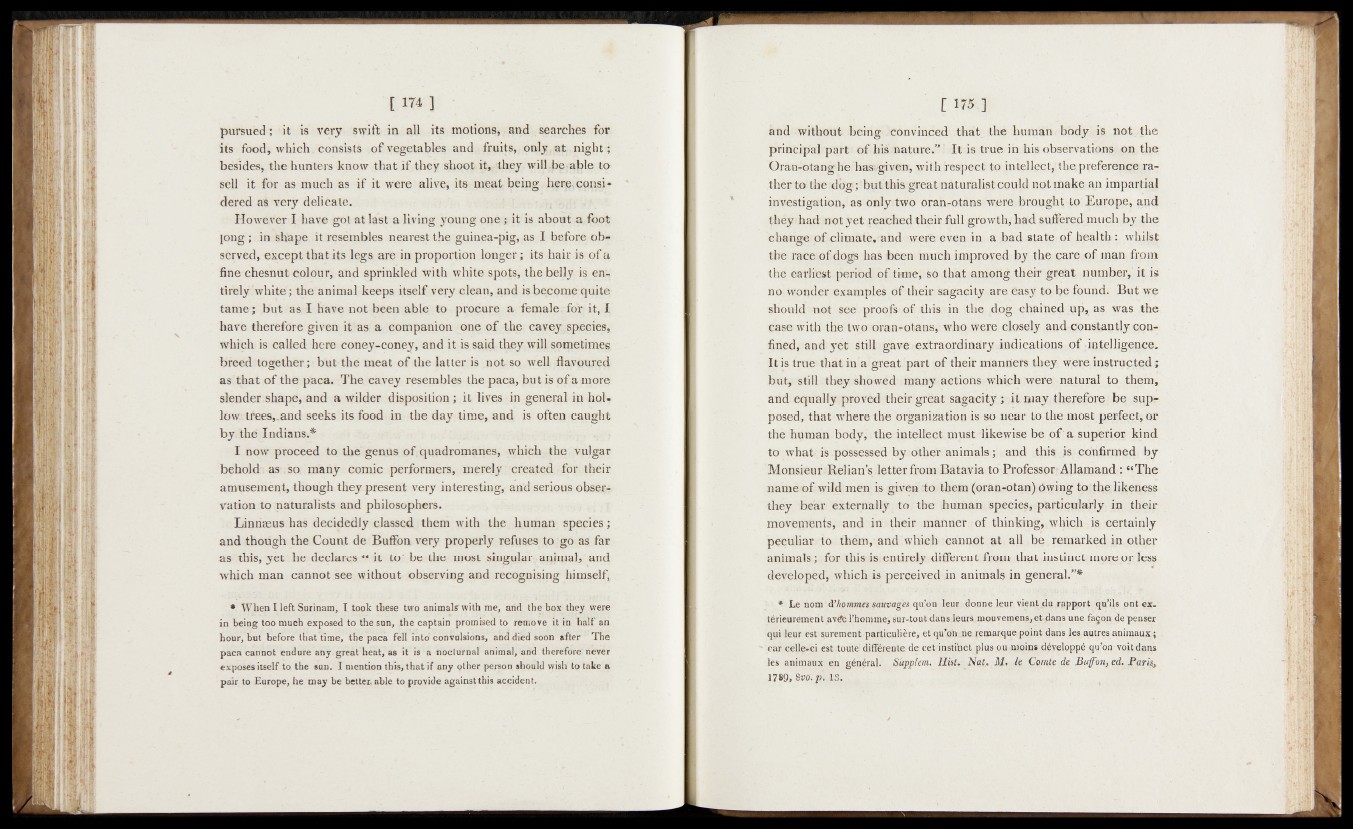
pursued f ?vit is very swift in all its motions* and searches for
its food, which, consists of Vegetables and fruits, only a t night;
besides, the hunters know that if they sihoot it, -they- will.f>p«a}ile to
sell it for as much as if it were alive, its meat being hem,considered
as very delicate.
However I have got at last a living young one ; it is about a fout
png ; in shape it resembles nearest the guinea-pig, as I before observed,
except that its legs are in proportion longer ; its hair is of a
fine chesniit colour, and sprinkled with white spots, the belly is enV
tirely'white; the animal keeps itself very clean, and is becomequite
tame ; but as I have not been able to procure a female,:for; it, I
have therefore given it‘as a companion one of the cavey. species,
which is called; here coney-coney, and it is said they will sometimes
breed together; -but the meat of the latter is not so well flavoured
as that of the paca. The cavey resembles the paca, but is pf a more
slender,shape, and a wilder disposition ; it lives in general in hollow..
treesj.and seeks its food in the day time, and if often caught
by the Indians.*
I now proceed to the genus of. quadromanes, which -the, vulgar
behold ; as . so, many comic performers, merely ’'created for Aeir
amusemènt, though they present very interesting, and serious-obsejj-f
vation to naturalists and philosophers.
Linnaeus has decidedly classed them with the human species;
and though the Count de Buffon very properly refuses to go as far
as this, yet he declares “ it to be the most singular animal, and
which man cannot see without observing and recognising himself,
* When L left Surinam, I took these two animal* with me, arid the box they were
in being too much exposed to the sun, the captain promised to remove it in half an
hour, but before that time, the paca fell into convulsions, and died soon after The
paca cannot endureany. great'heat, as it is a nocturnal animal; and therefore; never
exposes itself to the snn. I mention this, that if any other person, should wish to take a
pair to Europe, he may be better, able to provide against this accident.
and without being convinced that the human, body is not, the
principal part ofSMs mature.’'; It is true in bis observations on the
Oran^otangthie hasvgiven, with respect to intellect*:the,preference ra-
ther to the dbg«;%.imthis.great naturalist cauld not make, an impartial
investigation,: asj only .two oran-otan&iwere..« brought to Europe, and
they shad not yet reached their full growth, had suflèredinuch by the
change ofcliuiate.'ahd were even in a bad state, of health : whilst
the racesofdogs has feèen much improved by’ the care^qf man from
the earliest period of ticne, so that among their great .npmber, it is
no. wonder- examples of their sagacity are éasy to be found. But we
should not see proofs.of this in the dpgchained up, as was the
case with the two oran-ot,ans; who were; closely and «constantly confined,
and yet still gave-extraordinary .indications, of intelligence.
It is true that in a great part pf their manners they« were instructed;
but, still , they showed many actions which were natural to them,
and equaIly<.provèd their great sagacity ; it may, therefore| be sup?
posed, that where the organization *isso near tothe most perfectî or
the human.body, the intellect must 'likewise be p f a superior, kind
to whatt is possessed by . other animals ; and -this: is confirmed by
MonsieuriRelian’s letter from Batavia?to BrofessOrjAUamand : “The
name'©f wild men is given to. them (oran-otan) pwing tp I the; likeness
they bear externally to the human species,.particiilarly in their
movements, and in their manner ,-of thinking, which ; is certainly
peculiar; to them, and which cannot at all be. remarked in other
animals ; for this: is, entirely different from that instinct;more or less
developed, which is perceived in animals in general.”*
* Le now ‘-à’hommes:sauvages qu’on • ten* don ne leu r vient du rapport qu’ils p ni ex.
térieurémehlavèfc fhomme, sur-tout dafts!leur§,mouveroen,s, efc/lans une f^ q a de penser
qui leur est sûrement particulière, et’qu’phs.ne.remarque point dans les.autres animaux ;
car celle-ci est;toute différente de cet instinct plus ou«inpiqji d^yelpppé qu’on voitdar^s
les animaux en général. • Sùpplem. Bist,;- liât;. ,M , Gvmie d? B u ffo n ^ ed . Pa ris^
1789, 8®ô". p, 13. ;